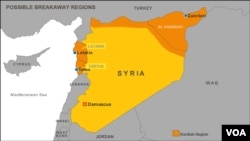A growing number of soldiers and civilians in government-controlled areas of Syria are expressing rare public disaffection with the regime of President Bashar al-Assad. Noncombatants as well as the military in traditionally loyal coastal regions are complaining that not enough is being done to relieve enclaves besieged by rebels.
Political activists also report rising alarm at the increasing presence of Tehran-backed foreign fighters from Lebanon, Afghanistan and Iran.
In recent days, foreign Shi'ite fighters along with militiamen in the National Defense Force forcibly dispersed young protesters in the port city of Tartus, according to activists working with the pro-opposition television station Halab Today.
The station reported a wave of small-scale demonstrations erupting in several coastal towns earlier this week over Iran’s mounting military and political involvement in Syria. Especially sharp clashes were reported in Jablah, a town 25 kilometers south of the city of Latakia.
Iranian forces inside Syria resented
Iran, Assad’s closest foreign ally, has supplied crucial support to the regime — from arms supplies to military expertise and funding — and the NDF was trained by Iranian revolutionary guardsmen.
The protests are just the latest this summer in Tartus and its near neighbor, Latakia. On August 12, dozens of Tartus residents staged a sit-in outside the main local government building, calling on the country’s leadership to do more to help soldiers at a northern airbase currently besieged by Islamic State extremists.
They displayed banners urging the government to send a relief force to Kwaires military airport to the east of Aleppo. One read: "We want the bodies of our martyrs; we want the injured; break the siege imposed on our resilient heroes."
Most of Tartus' nearly 100,000 residents are members of the president’s minority Alawite sect, an offshoot of Shi'ite Islam. Tartus has been dubbed "the capital of martyrs" because of the high number of its men who have been killed while serving in army or in militia forces loyal to the Assad regime.
Dissatisfaction spreading
But even members of the Syrian military are showing dissatisfaction with the war.
Activists with the Syrian Observatory for Human Rights, a London-based monitoring group that gathers news from informants on the ground, report mounting anger at the airbase among officers and soldiers, some of them conscripts from the coast, over their grim plight.
"They are convinced the regime has no serious plan to lift the siege," said Rami Abdulrahman, the observatory's executive director.
The troops fear the same fate of the loyalist forces holed up last year in Al-Tabqa airbase, he said. The base fell last summer to Islamic State extremists, who butchered more than 250 of the defenders.
Latakia, Assad’s hometown, likewise has experienced a series of recent street demonstrations. Protests were sparked initially by local anger over the August 6 slaying of a prominent local Alawite colonel, Hassan al-Sheikh. The senior air force officer was gunned down in a road-rage incident by one of the president's cousins, Suleiman al-Assad.
The dead man’s brother, who was in the car, told Syrian radio station Sham FM that Suleiman "overtook us and then blocked the road.
"My brother got out of the car and identified himself as an officer," the man continued. "The guy cursed my brother and the Syrian army. He then pointed a Kalashnikov out of the car's window and shot at us, and that's when I saw my brother was killed."
Initially, no action was taken against the president’s cousin. But with local outrage boiling, government authorities on August 10 arrested Suleiman al-Assad for murder, promising justice would be done.
No sanctuary from war
For much of the war, the coastal provinces have been insulated, but now the conflict has arrived. Rebel groups as well as Islamic extremists are targeting the coast and area near the city of Latakia, one of the last major towns in Syria under full government control.
It isn’t the first time discontent has brimmed over publicly in loyalist areas. Last year, following the Islamic State's dtring of mass abductions and slayings of Syrian soldiers, regime supporters poured out their anger in a Twitter campaign questioning how many more sacrifices would have to be made before the civil war ends. Damascus also has seen small protests.
Assad, in several interviews, has acknowledged his forces have suffered serious reversals in battling the insurgents.
During a May 6 Martyrs Day commemoration in Damascus, he referred to rebel gains as the "ups and downs" of war, but he painted a more sober picture of the fighting and urged Syrians to "boost the morale" of government soldiers.





